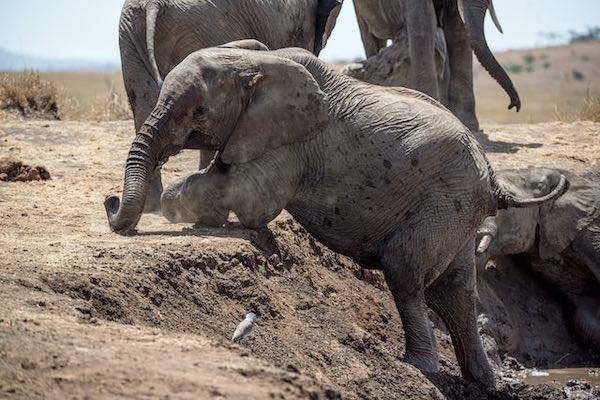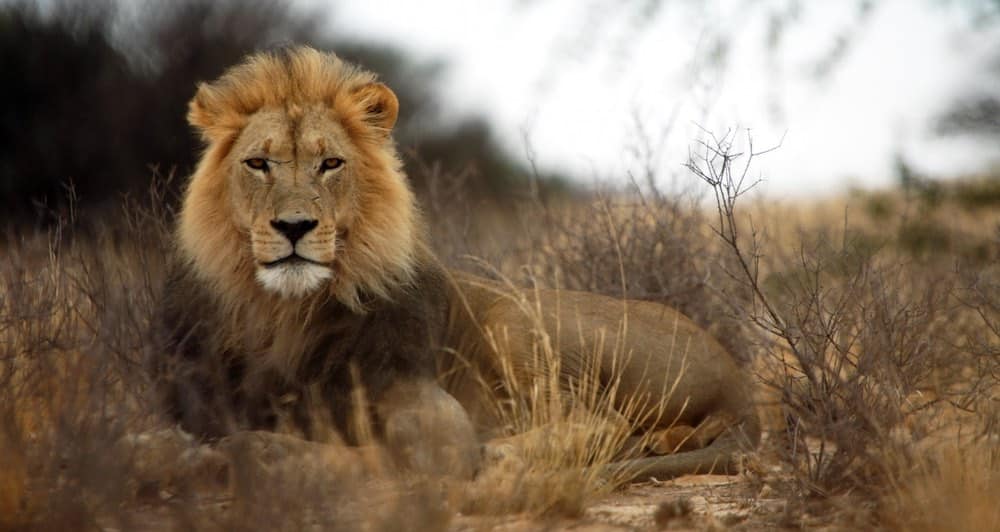In freier Wildbahn sind Elefanten vorsichtige Geschöpfe, die sich leicht erschrecken lassen. Selbst in Zoos haben Elefanten den Ruf, unberechenbar zu sein und aus ihren Gehegen auszubrechen.
Wovor genau haben Elefanten Angst? Haben sie irgendwelche natürlichen Feinde? Gibt es Tiere, die gerne auf sie Jagd machen?
Aufgrund ihrer Größe gibt es nicht viele Tiere, die eine Bedrohung für Elefanten darstellen. Erwachsene Elefanten können von großen Raubtieren wie Löwen, Tigern und Krokodilen angegriffen werden.
Diese Angriffe sind jedoch äußerst selten, da erwachsene Elefanten in der Regel allein oder in kleinen Gruppen leben, was es den Jägern erschwert, sie zu finden.
Wenn ein Elefant jung ist, ist er viel anfälliger für Angriffe durch andere Arten.
Wovor haben Elefanten Angst, wenn sie jung sind?

Trennung von ihrer Mutter
Wie bereits erwähnt, haben Elefanten vor vielen Dingen Angst, wenn sie jung sind. Eines der Dinge, vor denen sie sich am meisten fürchten, ist, von ihren Müttern getrennt zu werden.
Wenn ein Elefantenkalb von seiner Mutter getrennt wird, ist es oft verloren und verwirrt. Das liegt daran, dass Elefanten eine sehr starke Bindung zu ihren Müttern haben und sich auf deren Führung und Schutz verlassen.
Wenn ein Kalb von seiner Mutter getrennt wird oder ihre HerdeWenn sie sich nicht mehr bewegen kann, schreit sie oft nach ihr, was Raubtiere anlocken kann.
Raubtiere
Elefanten haben eine niedrige Überlebensrate, wenn sie jung sind. Man geht davon aus, dass bis zu 50% der Kälber ihr erstes Jahr nicht überleben.
Eine weitere Sache, vor der sich Elefanten fürchten, wenn sie jung sind, sind Raubtiere. Babyelefanten sind viel anfälliger für Angriffe von Löwen, Tigern und anderen großen Raubtieren.
Das liegt daran, dass sie nicht die Größe und Stärke entwickelt haben, um sich gegen diese Tiere zu verteidigen.
Wenn sie jung sind, sind Elefantenbabys relativ wehrlos gegenüber Raubtieren.
Wenn diese Raubtiere angreifen, steigt die Angst der Elefanten, und die Tiere mit relativ schlechtem Sehvermögen können durch alles aufgeschreckt werden, selbst wenn eine Maus vorbeifliegt.
Außerdem sind junge Elefanten eher allein oder in kleinen Gruppen unterwegs, was sie zur leichten Beute für Raubtiere macht.
Gefangen sein
Eine andere Sache, vor der sich Elefanten fürchten, ist, von Menschen gefangen zu werden. Das liegt daran, dass Elefanten oft wegen ihrer Elfenbeinstoßzähne gejagt werden, die sehr wertvoll sind.
Infolgedessen werden Elefanten häufig wegen ihrer Stoßzähne getötet, was ein großes Problem für den Naturschutz darstellt.
Darüber hinaus werden Elefanten auch gefangen und in den Wildtierhandel verkauft. Die dressierten Elefanten werden zur Unterhaltung oder als Arbeitskräfte eingesetzt. Dies ist eine missbräuchliche Industrie, in der Elefanten oft misshandelt und getötet werden.
Empfohlene Lektüre: Fakten über Elefantenbabys. Alles, was Sie über Elefantenkälber wissen wollten.
Elefanten und Raubtierverhalten
Wenn ein Raubtier die Gelegenheit hat, einen Elefanten anzugreifen, ist es unwahrscheinlich, dass es erfolgreich ist. Ausgewachsene Elefanten sind aufgrund ihrer Größe, Stärke und Widerstandsfähigkeit sehr schwer zu töten.
Wie bereits erwähnt, werden die meisten Angriffe auf junge Kälber abzielen. Studien zeigen, dass Löwen und Tiger es vorziehen, ihre Beute in der dichten Vegetation aufzulauern. So können sie sich leichter verstecken und an die Elefanten heranschleichen.
Auch schwangere Elefanten sind anfällig für Angriffe, da sie langsamere Reflexe haben und weniger beweglich sind als normal.
Sobald ein Elefant einen Angriff bemerkt, versucht er zu fliehen, aber wenn er in die Enge getrieben wird, wehrt er sich mit seinem Stoßzähne. Wenn Elefanten zum Angriff übergehen, kann man sie oft sehen Laden gegen ihren Gegner.
Raubtiere, die Elefanten jagen
Löwen und Tiger
Sowohl Tiger als auch Löwen sind dafür bekannt, dass sie Elefanten jagen. Löwen bevorzugen es, in Gruppen zu jagen und ihre Beute aus dem Hinterhalt zu erlegen.
Sie jagen besonders gerne Elefantenbabys und sind dafür bekannt, dass sie Herden erwachsener Tiere angreifen, um an die jungen Kälber zu gelangen.
Tiger neigen dazu, sich an ihre Beute heranzupirschen und greifen den Elefanten lieber von hinten an. Sie stehen auf Heimlichkeit und Raffinesse.
Sie ziehen es auch vor, den Babyelefanten aufzulauern und warten, bis die Herde vorbeigezogen ist, bevor sie aufspringen und angreifen.
Hyänen jagen große Elefanten nicht sehr oft, aber wenn sie es tun, greifen sie sie auch gerne von hinten an. Sie sind schnelle Tiere, die diesen großen Kreaturen schaden können, auch wenn der eigentliche Angriff nicht erfolgreich ist.
Krokodile
Krokodile sind Raubtiere, die in Flüssen auf der Lauer liegen und darauf warten, dass sich ihre Beute dem Wasser nähert. Sie sind dafür bekannt, dass sie mehrere Elefanten angreifen, wenn diese zum Trinken kommen.
Sie sind eine relativ seltene Art in Gebieten mit Elefanten, aber dafür bekannt, dass sie ihre Beute packen und ins Wasser ziehen, was sie zu einer Gefahr für Elefanten macht.
Schlangen
Wenn ein Elefant auf eine Schlange tritt, beißt sie ihn in den Fuß. Wenn die Schlange groß genug ist, kann sie dem Fuß großen Schaden zufügen und den Elefanten sogar mit ihrem Gift töten.
Oft sieht man Elefanten, die mit dem Fuß wackeln - eine Methode zur Schlangenvermeidung. Schlangen sind Raubtiere, die sich im Hinterhalt verstecken und warten, bis sich ihre Beute nähert.
Schlangen sind tagsüber selten zu sehen, daher ist es unwahrscheinlich, dass ein Elefant eine Schlange sieht, es sei denn, er tritt auf sie.
Andere Raubtiere
Wölfe und Leoparden werden sich an die Herde heranpirschen und versuchen, ein schwaches Individuum auszusuchen. Gelingt es ihnen, die Herde von dem verletzten Elefanten zu vertreiben, beginnen sie mit dem Fressen des Kadavers.
Dies kann für die anderen Elefanten gefährlich sein, da sie bei dem Versuch, das Raubtier zu vertreiben, gebissen werden könnten.
Was ist mit Elefanten, die Angst vor Mäusen haben?
Es gibt keine wissenschaftlichen Beweise für die Behauptung, dass Elefanten Angst vor Mäusen haben. Es gibt jedoch einige anekdotische Berichte aus Kenia und Tansania, die darauf hindeuten, dass Elefanten Angst vor diesen kleinen Nagetieren haben könnten.

Einige Wissenschaftler glauben, dass der Mythos aus der afrikanischen Folklore entstanden ist. Die Geschichte besagt, dass vor langer Zeit ein Elefant auf eine Maus trat und die Maus quietschte. Das Geräusch erschreckte den Elefanten und er lief weg. Seitdem haben Elefanten Angst vor Mäusen.
Einige Leute argumentieren, dass Elefanten Angst vor Mäusen haben könnten, weil sie sehr klein sind und ihre Bewegungen schwer vorherzusehen sind. Außerdem geben Mäuse hohe Geräusche von sich, die den Elefanten in Panik versetzen oder ihn etwas nervös machen.
Ein weiteres Argument ist, dass Elefanten einen ausgeprägten Geruchssinn haben, so dass sie in der Lage sein könnten, die Angst einer Maus zu riechen.
Es gibt jedoch auch mehrere Argumente, die gegen die Vorstellung sprechen, dass Elefanten Angst vor Mäusen haben. Elefanten sind sehr große und kräftige Tiere, es ist unwahrscheinlich, dass sie sich vor etwas so Kleinem fürchten würden.
Außerdem sind Elefanten nicht dafür bekannt, dass sie Angst vor anderen kleinen Tieren wie Ratten oder Kaninchen haben.
Insgesamt sprechen die vorliegenden Beweise nicht für die Behauptung, dass Elefanten Angst vor Mäusen haben. Es ist wahrscheinlicher, dass es sich um einen Mythos handelt als um eine genaue Beschreibung der Elefantenverhalten die in der Populärkultur, z. B. in Zeichentrickfilmen für Kinder, weiterlebt.
Abschließende Überlegungen
Wie Sie sehen, sind Elefanten in der Wildnis vielen Gefahren ausgesetzt. Von Menschen bis hin zu anderen Tieren, denn wenn sie schwach oder klein sind, müssen sie sich vor vielen Raubtieren in Acht nehmen.
Obwohl die Gefahr immer besteht, gibt es nur sehr wenige Tiere, die gerne Elefanten jagen.
In freier Wildbahn werden erwachsene Elefanten nur von Löwen und Tigern angegriffen. Der Elefantenrüssel und die Elefantenfüße werden zur Verteidigung eingesetzt.
Wenn ein Elefant jung ist, ist er jedoch viel verletzlicher, da er klein ist und wenig oder keine Erfahrung im Kampf gegen Raubtiere hat.
Als Spezies haben sie jedoch gelernt, vorsichtig zu sein, und lassen sich durch laute Geräusche und Veränderungen in ihrer Umgebung leicht erschrecken.
So können sie den Gefahren in ihrem Lebensraum entgehen und ein langes und gesundes Leben genießen.
